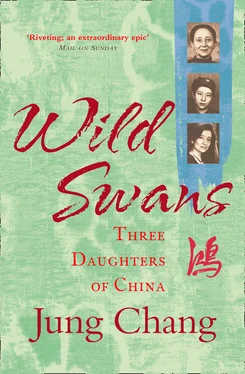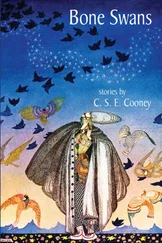On festivals and other important occasions, the whole family had to kowtow and curtsy to her, and she would have to jump up from her chair and stand to one side to show that she had left the chair empty, which symbolized their late mother, to acknowledge their respect. Manchu custom conspired to keep her and Dr Xia apart. They were not supposed even to eat together, and one of the daughters-in-law always stood behind my grandmother to serve her. But the woman would present such a cold face that my grandmother found it difficult to finish her meal, much less enjoy it.
Once, soon after they had moved into Dr Xia’s house, my mother had just settled down into what looked like a nice, comfortable, warm place on the kang when she saw Dr Xia’s face suddenly darken, and he stormed over and roughly pulled her off the seat. She had sat in his special place. This was the only time he ever hit her. According to Manchu custom, his seat was sacred.
The move to Dr Xia’s house brought my grandmother a real measure of freedom for the first time—but also a degree of entrapment. For my mother it was no less ambivalent. Dr Xia was extremely kind to her and brought her up as his own daughter. She called him ‘Father’, and he gave her his own name, Xia, which she carries to this day—and a new given name, ‘De-hong’, which is made up of two characters: Hong , meaning ‘wild swan’, and De , the generation name, meaning ‘virtue’.
Dr Xia’s family did not dare insult my grandmother to her face—that would have been tantamount to treason to one’s ‘mother’. But her daughter was another matter. My mother’s first memories, apart from being cuddled by her mother, are of being bullied by the younger members of Dr Xia’s family. She would try not to cry out, and to hide her bruises and cuts from her mother, but my grandmother knew what was going on. She never said anything to Dr Xia, as she did not want to upset him or create more problems for him with his children. But my mother was miserable. She often begged to be taken back to her grandparents’ house, or to the house General Xue had bought, where everyone had treated her like a princess. But she soon realized she should stop asking to ‘go home’, as this only brought tears to her mother’s eyes.
My mother’s closest friends were her pets. She had an owl, a black myna bird which could say a few simple phrases, a hawk, a cat, white mice, and some grasshoppers and crickets which she kept in glass bottles. Apart from her mother, her only close human friend was Dr Xia’s coachman, ‘Big Old Lee’. He was a tough, leathery-skinned man from the Hinggan mountains in the far north, where the borders of China, Mongolia, and the former Soviet Union meet. He had very dark skin, coarse hair, thick lips, and an upturned nose, all of which are very unusual among Chinese. In fact, he did not look Chinese at all. He was tall, thin, and wiry. His father had brought him up as a hunter and trapper, digging out ginseng roots and hunting bears, foxes, and deer. For a time they had done very well selling the skins, but they had eventually been put out of business by bandits, the worst of whom worked for the Old Marshal, Chang Tso-lin. Big Old Lee referred to him as ‘that bandit bastard’. Later, when my mother was told the Old Marshal had been a staunch anti-Japanese patriot, she remembered Big Old Lee’s mockery of the ‘hero’ of the northeast.
Big Old Lee looked after my mother’s pets, and used to take her out on expeditions with him. That winter he taught her to skate. In the spring, as the snow and ice were melting, they watched people performing the important annual ritual of ‘sweeping the tombs’ and planting flowers on the graves of their ancestors. In summer they went fishing and gathering mushrooms, and in the autumn they drove out to the edge of town to shoot hares.
In the long Manchurian evenings, when the wind howled across the plains and the ice froze on the inside of the windows, Big Old Lee would sit my mother on his knee on the warm kang and tell her fabulous stories about the mountains of the north. The images she took to bed were of mysterious tall trees, exotic flowers, colourful birds singing tuneful songs, and ginseng roots which were really little girls—after you dug them out you had to tie a red string around them, otherwise they would run away.
Big Old Lee also told my mother about animal lore. Tigers, which roamed the mountains of northern Manchuria, were kind-hearted and would not hurt human beings unless they felt threatened. He loved tigers. But bears were another matter: they were fierce and one should avoid them at all costs. If you did happen to meet one, you must stand still until it lowered its head. This was because the bear has a lock of hair on his forehead which falls over his eyes and blinds him when he drops his head. With a wolf you should not turn and run, because you could never outrun it. You should stand and face it head-on, looking as though you were not afraid. Then you should walk backwards very, very slowly. Many years later, Big Old Lee’s advice was to save my mother’s life.
One day when she was five years old my mother was in the garden talking to her pets when Dr Xia’s grandchildren crowded around her in a gang. They started jostling her and calling her names, and then began to hit her and shove her around more violently. They forced her into a corner of the garden where there was a dried-up well and pushed her in. The well was quite deep, and she fell hard on the rubble at the bottom. Eventually someone heard her screams and called Big Old Lee, who came running with a ladder; the cook held it steady while he climbed in. By now my grandmother had arrived, frantic with worry. After a few minutes, Big Old Lee resurfaced carrying my mother, who was half unconscious and covered with cuts and bruises. He put her in my grandmother’s arms. My mother was taken inside, where Dr Xia examined her. One hipbone was broken. For years afterwards it sometimes became dislocated, and the accident left her with a permanent slight limp.
When Dr Xia asked her what had happened, my mother said she had been pushed by ‘Number Six [Grandson]’. My grandmother, ever attentive to Dr Xia’s moods, tried to shush her up because Number Six was his favourite. When Dr Xia left the room, my grandmother told my mother not to complain about ‘Number Six’ again, so as not to upset Dr Xia. For some time my mother was confined to the house because of her hip. The other children ostracized her completely.
Immediately after this, Dr Xia began to go away for several days at a time. He went to the provincial capital, Jinzhou, about twenty-five miles to the south, looking for a job. The atmosphere in the family was unbearable, and my mother’s accident, which might easily have been fatal, convinced him that a move was essential.
This was no small decision. In China, to have several generations of a family living under one roof was considered a great honour. Streets even had names like ‘Five Generations Under One Roof to commemorate such families. Breaking up the extended family was viewed as a tragedy to be avoided at all costs, but Dr Xia tried to put on a cheerful face to my grandmother, saying he would be glad to have less responsibility.
My grandmother was vastly relieved, although she tried not to show it. In fact, she had been gently pushing Dr Xia to move, especially after what happened to my mother. She had had enough of the extended family, always glacially present, icily willing her to be miserable, and in which she had neither privacy nor company.
Dr Xia divided his property up among the members of his family. The only things he kept for himself were the gifts which had been bestowed on his ancestors by the Manchu emperors. To the widow of his eldest son he gave all his land. The second son inherited the medicine shop, and the house was left to his youngest son. He saw to it that Big Old Lee and the other servants were well taken care of. When he asked my grandmother if she would mind being poor, she said she would be happy just to have her daughter and himself: ‘If you have love, even plain cold water is sweet.’
Читать дальше












